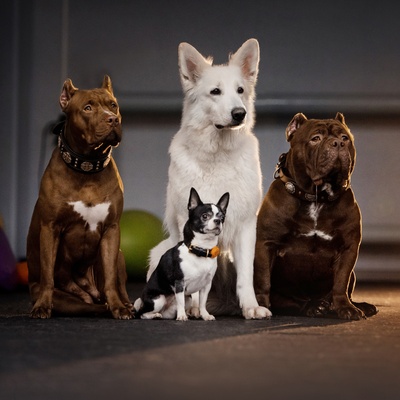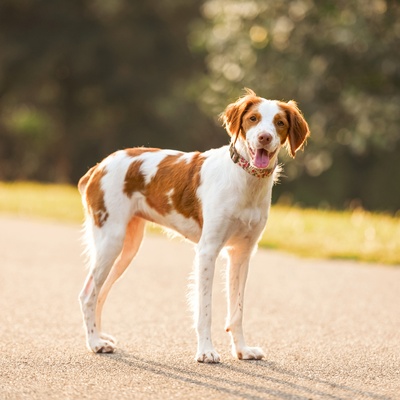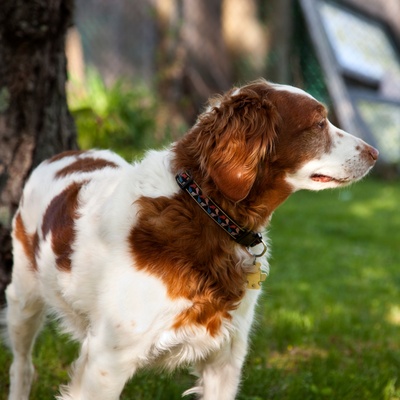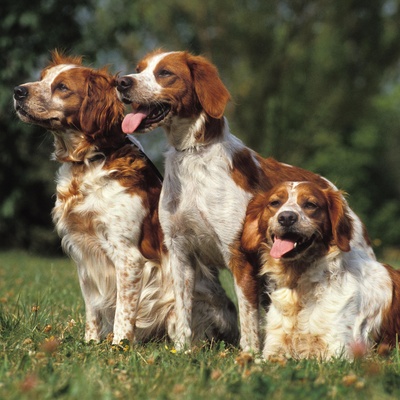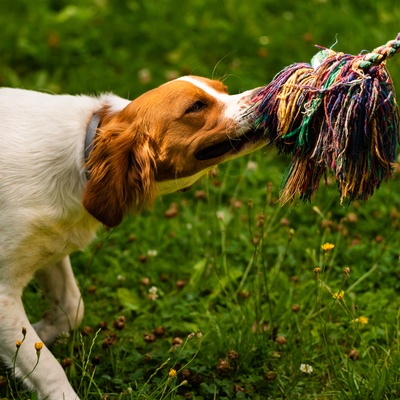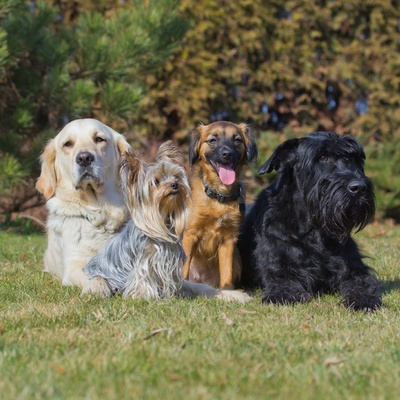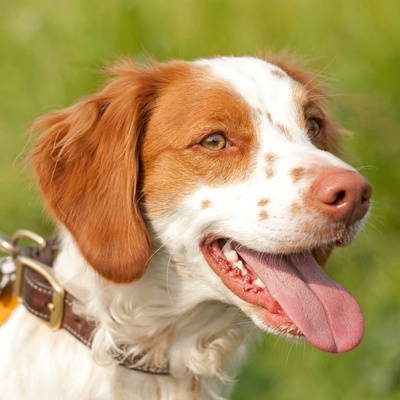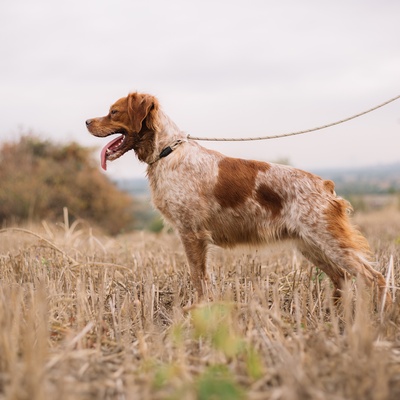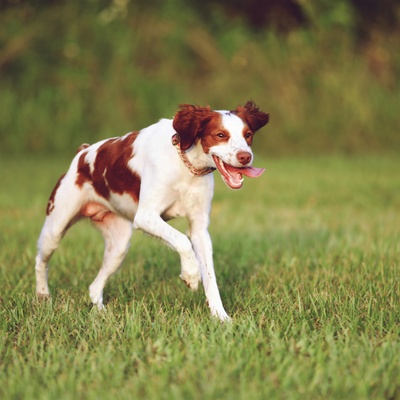Introducing the Brittany
Discover all there is to know about the Brittany: its characteristics, behavior, training, and its cost.
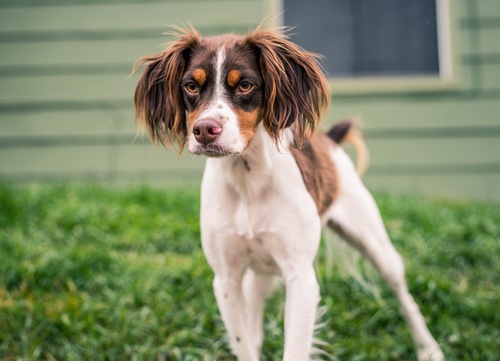
Discover all there is to know about the Brittany: its characteristics, behavior, training, and its cost.
Originating from the Brittany region of France, this breed's history is as rich and vibrant as its personality. Initially bred as a hunting dog, the Brittany is renowned for its agility, intelligence, and eagerness to please, making it a versatile companion not just in the fields but in homes across Great Britain. Recognized for its boundless energy and affectionate nature, the Brittany has secured a place in the hearts of dog lovers worldwide.
These dogs excel in various activities such as agility competitions, obedience, and even as therapy dogs. Their nature is inherently loyal and affectionate, making them an ideal family pet. Known for their sociability, Brittanys thrive on human interaction and display an immense amount of affection towards their owners and family members, embodying the essence of a spirited companion for the active family.
This section outlines the unique features of the Brittany breed.
The Brittany belongs to the sporting group (7), which includes dogs bred primarily for hunting and fieldwork. This group is known for its intelligence, energy, and strong work ethic.
Brittanys are medium-sized dogs. They typically stand between 17.5 to 20.5 inches at the shoulder and weigh between 30 to 40 pounds, making them agile and easy to handle.
Brittanys possess a dense, flat or wavy coat. This type of fur provides them with protection against the elements while being relatively easy to maintain.
The Brittany's coat can showcase a variety of colors, predominantly orange and white or liver and white. Some Brittanys may also exhibit roan patterns, adding to their distinctive appearance.
Brittanys thrive in environments where they can expend their abundant energy. While they can adapt to living in smaller spaces, they require ample exercise and mental stimulation to stay happy and healthy.
Known for their friendly and sociable nature, Brittanys are excellent family pets. They generally get along well with children and other animals, making them a great addition to a lively household.
Brittanys are generally healthy dogs but, like any breed, they can be prone to specific health issues such as hip dysplasia and epilepsy. Regular veterinary check-ups are important to maintain their health.
Brittanys are intelligent and quick learners. They respond best to positive reinforcement techniques. Patience and consistency are key in harnessing their potential.
We can help!
Every dog has its own character, and so do you. Making the right choice will ensure his well-being and yours.
Take our quiz to find out which breed is right for you, based on your personality, lifestyle, location and many other criteria.
Don't wait any longer and take the quiz to find out the answer!
Brittanys are medium-sized dogs known for their harmonious build and athletic appearance. Their distinctive coats, often in vibrant orange and white or liver and white patterns, complement their expressive faces, highlighted by their bright, alert eyes.
Brittanys stand out for their moderate size. Females and males typically measure between 17.5 to 20 inches at the shoulder. As for weight, females generally weigh between 30 to 40 pounds, and males are in a similar range.
Brittanys experience a relatively rapid growth phase, reaching a significant portion of their adult size by 6 months of age. They typically achieve their full adult size and weight by the age of 12 to 14 months, ready to accompany their owners on all kinds of adventures with their enduring stamina and agility.
The Brittany sports a coat that strikes a balance between functionality and aesthetics. Its fur is of medium length, yet dense enough to offer protection from the elements. The coat may exhibit a slight wave, with fringes on the legs and under the belly, enhancing the breed's elegant yet rugged appearance.
The Brittany's coat boasts a distinctive palette, primarily showcasing combinations of orange and white or liver and white. These colors can appear in various patterns, from clear, defined patches to more mingled or roan mixtures, giving each Brittany a unique look.
The Brittany's coat, while not excessively demanding, does require regular attention to maintain its condition and appearance. The breed sheds moderately throughout the year, with seasonal variations. Regular brushing, about once or twice a week, helps manage shedding and keeps the coat healthy.
Unlike breeds with longer fur, Brittanys do not require frequent baths; however, occasional baths can keep their coat clean and reduce odors, especially considering their active lifestyle. Attention should also be given to their ears, especially after outdoor activities, to prevent infections common in breeds with floppy ears.
The Brittany is the epitome of balance and proportion, crafted perfectly for agility and endurance. The breed presents a well-defined, slightly rounded head with a medium-length muzzle that balances harmoniously with the rest of its features. Its eyes, expressive and alert, are of a dark amber or hazel color, set well apart to give a keen, intelligent gaze.
The Brittany's ears are a distinguishing characteristic, set high on the head, triangular in shape, and drooping. The body underscores the breed's athleticism, showcasing a solid yet not bulky musculature. This streamlined physique is topped with a medium-length tail, which may be naturally short or docked in countries where it is permitted, adding to their efficient, active silhouette.
The Brittany is renowned for its enthusiastic, friendly nature, marked by a high level of intelligence, eagerness to please, and an innate sense of loyalty. These traits make the Brittany an adaptable and affectionate companion.
With over 400 recognized dog breeds categorized into 10 distinct groups, the Brittany is part of the sporting group (7), which encompasses breeds known for their abilities in the field as hunters and retrievers. This group includes diverse breeds such as Spaniels, Pointers, and Setters, each with unique talents for game finding and retrieval.
Brittanys, in particular, stand out within this group for their remarkable intelligence, obedience, and gentle nature. Their strong hunting instincts are matched by an equally strong desire for human companionship, making them both excellent field dogs and loving family pets. The primary role of the Brittany, leveraging its agility and keen sense of smell, is as a pointer and retriever, excelling in both upland bird hunting and as a companion in outdoor activities.
Brittanys are known for their boundless energy and joyful disposition, making them excellent companions for active individuals and families. Their eagerness to please and affectionate nature means they form strong bonds with their owners, thriving on attention and interaction.
A Brittany requires an owner who is present and engaged, as their intelligence and energy necessitate mental and physical stimulation for proper development. While they do appreciate some independence, Brittanys are most content when included in family activities, showcasing their loyalty and affection.
The Brittany's sociable and friendly demeanor makes them a joy to have in any household. They are known for their kind-heartedness and get along splendidly with humans, including strangers, making them poor candidates for guard dogs but excellent companions. Brittanys are particularly good with children, displaying patience and gentleness that make them ideal family pets.
To ensure they grow into well-adjusted adults, it's crucial to socialize them from a young age, introducing them to a variety of people, animals, and situations. This early socialization helps foster their natural sociability and ensures they remain amiable and confident throughout their lives.
Take the test and find out the dog breed that matches your personality and lifestyle.
The Brittany is remarkably adaptable, capable of thriving in various living situations, including apartments, houses, and both urban and rural settings. Daily walks are essential, with a recommendation of at least an hour of vigorous exercise to keep them satisfied and healthy. This breed's adaptability does not negate the need for a committed owner ready to engage in regular, interactive activities.
While Brittanys can adjust to life without a yard, they benefit significantly from having access to an outdoor space where they can explore and expend their boundless energy. Their inherent curiosity and athleticism mean they thrive in environments where they can run freely, whether that's a large backyard or nearby open spaces such as parks or countryside.
The Brittany is distinguished by its quick learning ability and superior intelligence, traits that make it a delight to train. This breed excels when training is based on positive reinforcement and consistency, thriving on engaging activities that challenge both their mind and body.
Given their hunting background, Brittanys have a strong instinct to explore and may wander if given the chance. Equipping them with a GPS collar, such as those offered by Weenect, can provide peace of mind by ensuring their safety during outdoor adventures, preventing losses or escapes.
Brittanys are renowned for their exceptional listening skills, making them highly responsive to commands and eager to please their owners. Their training can be uniquely tailored to leverage these qualities, emphasizing recall and obedience that capitalize on their natural attentiveness.
Early socialization and exposure to a variety of environments and situations will enhance their well-rounded development, ensuring they grow into well-behaved and adaptable dogs. The Brittany's willingness to learn, combined with their affectionate nature, makes them ideal candidates for a wide range of activities, from hunting and agility to therapy work, showcasing their versatile skill set.
The Brittany is generally a healthy and robust dog breed, known for its active lifestyle and endurance in the field. However, daily care and preventative measures are essential to maintain their health and ward off diseases and infections.
Brittanys are known for their overall good health and resilience, but like all breeds, they have certain predispositions to specific health issues. Common concerns for Brittanys include hip dysplasia, ear infections due to their floppy ears, and epilepsy. They may also be prone to conditions such as hypothyroidism and certain eye disorders.
Symptoms can vary, but being vigilant about changes in behavior or health is crucial. Brittanys typically enjoy a lifespan of 12 to 15 years, reflecting their generally robust health when properly cared for.
Regular veterinary check-ups are vital for the Brittany, ensuring they stay up to date with vaccinations, deworming, and parasite prevention as recommended. Daily care routines should include regular brushing to manage shedding, weekly ear cleaning to prevent infections, and dental care to avoid plaque buildup and gum disease. Nail trimming is also important to prevent discomfort and mobility issues.
While Brittanys are not known to be hypoallergenic, being aware of and managing potential allergies with your vet's guidance can help maintain their overall well-being and quality of life.
Every Brittany has its unique nutritional needs, but a balanced diet is key to maintaining its energy and health. A diet rich in proteins and essential vitamins is crucial for supporting the Brittany's active lifestyle and ensuring optimal health. Premium kibble, specifically formulated for active breeds, can provide a solid foundation for their daily diet.
For Brittanys with higher activity levels, supplementing their meals with lean sources of white and red meat can offer additional protein, helping to build and maintain muscle strength while keeping fat intake minimal. It's important to monitor portion sizes and feeding schedules to prevent overfeeding, ensuring your Brittany stays fit and trim.
The Brittany is highly regarded for its intelligence, energy, and versatility, making it a sought-after breed. There are several reputable breeders specializing in Brittanys, ensuring that prospective owners have options. It's important to consider several factors before adopting.
Before adopting a Brittany, it's essential to make an informed decision. It's crucial to select a reputable breeder, and visiting the premises allows you to assess the living conditions and the behavior of the dogs. The health of the puppy and its parents is paramount; transparent information about their health status and any hereditary illnesses should be provided by the breeder.
Lastly, you must have your dog microchipped by the age of 8 weeks old and have their details registered on a relevant database like Petlog or Animal Tracker. This is a legal requirement in Great Britain, and non-compliance could result in a
fine. Microchipping can be done by your vet for a small fee, or for free at any Blue Cross center.
The cost of acquiring a Brittany puppy can vary based on several factors, including the breeder's reputation, the dog's lineage and pedigree, and its age. Generally, the price range for a Brittany puppy can be anywhere from
to
.
However, owning a Brittany involves additional costs for their care, including food, veterinary visits, and potential training expenses. The annual cost of maintaining a Brittany's health and well-being can range from
to
, depending on their needs and lifestyle.
Choosing a dog that matches your personality and lifestyle will ensure your well-being and his!
To access the most relevant information, suitable payment methods, and delivery in your region, please select the website corresponding to your country.

